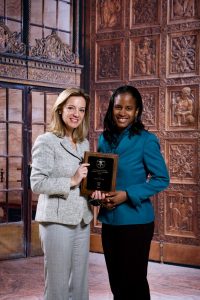Stacey Rizza, M.D., receives Teacher of the Year Award – first woman in her division
Stacey Rizza, M.D. (MED ’95, I ’98, INFD ’01), is the first woman in her division to receive the award in the more than 40 years of Teacher of the Year Awards at Mayo Clinic. “Our division has been predominantly men for a long time although there are a few women now,” she says. “Many truly great clinicians in my division have received the award in the past. I am honored to be by their side.
“Nationwide, infectious diseases has far more men than women because it’s a subspecialty, and not as many women go into specialty training or academic medicine.”
A consultant in the Division of Infectious Diseases in the Department of Internal Medicine at Mayo Clinic in Rochester, Dr. Rizza joined the Mayo Clinic staff in 2004. She is associate dean for Student and Faculty Affairs, Mayo Clinic School of Health Sciences in Rochester, and an associate professor of medicine.
She oversees the HIV education programs including the HIV core curriculum, journal clubs and case conferences. Dr. Rizza also teaches in the graduate school and internal medicine residents and infectious disease fellows in addition to her administrative roles in Mayo Clinic School of Health Sciences.
How do you know when you’ve done a good job teaching?
With graduate students, I know I’ve succeeded when they understand the concepts and do well on tests. With residents and fellows, I know when they start to understand the knowledge and are able to question issues in infectious diseases and translate them to patient care.
What’s rewarding about teaching?
I love to see when students have “aha!” moments. I love seeing when residents and infectious diseases fellows progress as savvy practitioners who will care for patients all over the world.
In academic medicine I feel like I can make more of an impact in the world. If I teach residents and fellows and they go on to care for patients, I help make the world a healthier place.
What’s your teaching style?
I try to be casual and approachable. I like to discuss issues rather than stand at a podium and present data. I teach at a conceptual level and hate memorization. I want students to understand and know the pathogenesis and concepts we’re discussing.
How have students changed over the years?
They definitely have changed. They’re more vocal and ask more of their teachers. That’s a good thing. Millennials have a different personality. They believe education is for them — that they should have a voice. They engage and don’t just sit back. Educating them is more two-directional.
The internal medicine residents and fellows in the Division of Infectious Diseases are outstanding young physicians. It’s a joy to teach them. They make me a better doctor by spending time with them and teaching them.
Who were your teaching role models?
I’ve had many outstanding clinician and scientist teachers in infectious diseases who taught me to think analytically. I’m honored to be a product of the wonderful teaching I’ve had at Mayo Clinic.
What does the Teacher of the Year Award mean to you?
I was incredibly honored. Of all the hats I’ve worn at Mayo Clinic, being honored by the fellows, residents and students is the most important to me. It’s nice to know the residents and fellows appreciate you — it’s the greatest honor a clinician or scientist can get.
Student comments:
“Dr. Rizza’s approachable and friendly manner encourages interactive learning, discussion and decision-making.”
“She explains her thought process really well when we work with patients. She respects the trainee’s plan and gives a good balance of independence and supervision.”
“Dr. Rizza is very kind and pleasant to work with. She’s a role model to me of a confident, knowledgeable, patient, caring physician and teacher.”
Fast 5 with Dr. Rizza
1. What drew you to medicine?
I was a science and math kind of girl. I hated literature class. I like more analytical things.
My father [Robert Rizza, M.D. (ENDO ’80)], is an endocrinologist at Mayo Clinic, but I wasn’t interested in being a physician until my last year of college. Instead, I wanted to be an astronaut. I thought my best chance of getting on the Space Shuttle was to get a medical degree and become a mission specialist.
2. What drew you to infectious diseases?
When I started training, I knew I wanted to really focus in an area. Infectious diseases is both diverse and focused. It’s never boring, and it covers many areas — epidemics, public health, world medicine, pathogenesis of disease and society as a whole.
3. What’s your life outside of work?
My husband, Andrew Badley, M.D. (I ’94, INFD ’97), is also in the Division of Infectious Diseases, but he’s predominantly involved with research. He’s director of the Office of Translation to Practice. Our daughter, Lauren, lives and works in Halifax, Canada. Our daughter, Emma, is finishing her freshman year at Bates College in Lewiston, Maine; and our son, Joey, is in high school.
I enjoy sports — golf and running. I play music and spend time with family and friends. In the summer I love to sail and go as often as I can. Being an academic physician and mother takes up most of my time.
4. At what point in your career did you have your children?
I had my daughter during residency — before duty-hour regulations. I pumped milk and worked 30-plus-hour shifts without seeing her. I had my son during my fellowship and had to arrange lab time around a toddler and a baby.
It took a village to help out with family and child care. As a resident and fellow, you have no flexibility in your schedule.
5. How did you manage it all?
I’ve always worked and had an academic career. There were few women who had gone through this before in my division at the time to get advice from. My parents live in Rochester, and my mother was my nanny and provided back-up assistance. That’s the greatest gift she ever gave me. If a child were sick or had a piano lesson, she was always there to help.


